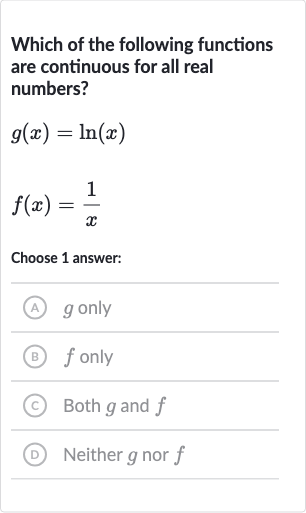Full solution
Q. Which of the following functions are continuous for all real numbers?Choose answer:A) only(B) only(C) Both and (D) Neither nor
- Question Prompt: Question prompt: Determine which of the given functions, and , are continuous for all real numbers.
- Analyze : Analyze the function . The natural logarithm function is defined only for x > 0. Therefore, is not continuous for all real numbers because it is not defined for .
- Analyze : Analyze the function . The function is defined for all real numbers except , where it has a vertical asymptote. Therefore, is not continuous at and thus not continuous for all real numbers.
- Conclusion: Since neither nor is continuous for all real numbers, the correct answer is (D) Neither nor .
More problems from Intermediate Value Theorem
QuestionGet tutor help

